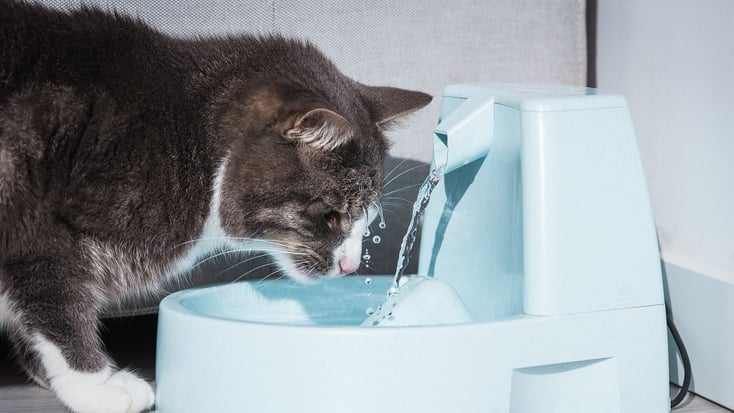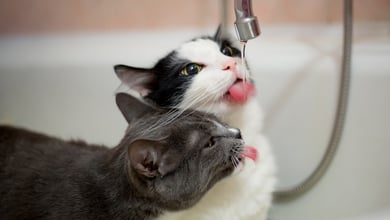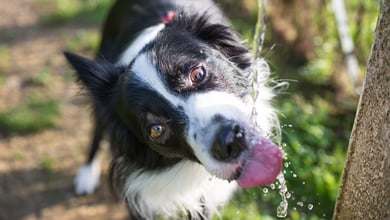Dehydration in Cats: Symptoms, Causes, & Treatment

Table of Contents
Do you ever wonder if your cat is drinking enough water? Cats can be sneaky about showing when they're thirsty, but water is crucial for their health.
Learn about cat dehydration: signs to look for, how to treat it, and tips to keep your furry friend hydrated and healthy.
Key Takeaways:
- Dehydration in cats occurs when their bodies lack sufficient water to function correctly, which can lead to health problems if left untreated.
- Cats should drink around 3.5 to 4.5 ounces of water for every 5 pounds they weigh daily, but individual needs may vary.
- Remember to consult with a veterinarian for ongoing dehydration concerns or health issues in your cat.
What Is Dehydration in Cats?
Dehydration in cats occurs when their bodies don’t have enough water to function optimally. Water is essential in supporting critical bodily processes such as digestion, circulation, and waste elimination. If left untreated, dehydration can result in health problems and put their well-being at risk.
Causes of Cat Dehydration
Below is a list of common causes that can trigger cat dehydration:
- Decreased fluid intake: Not eating or drinking as much or at all can quickly lead to cat dehydration.
- Gastrointestinal issues: Vomiting and diarrhea can cause rapid fluid loss, making dehydration a concern.
- Underlying medical conditions: Diabetes, renal disease, hyperthyroidism, and other conditions can result in increased water loss and dehydration.
- Fevers or traumatic injury: Elevated body temperature or injuries may contribute to cat dehydration.
- Environmental factors: Hot weather and dry air can deplete your cat's hydration levels.
1. Has your dog experienced rapid weight loss?
2. Has your dog’s appetite increased or decreased?
3. Is your dog more thirsty than usual?
4. Is your dog urinating more frequently than usual?
5. Is your dog less active than usual?
6. Does your dog have cloudy eyes or is experiencing vision problems?
7. Is your dog experiencing frequent urinary tract infections?
8. Does your dog have sweet-smelling breath?
9. Does your dog seem more lethargic than usual?
10. Does your dog have a family history of diabetes?
11. Is your dog's coat dull or thinning?
12. Has your dog had frequent skin infections?
1. Is your cat urinating more frequently than usual?
2. Is your cat more thirsty than usual?
3. Has your cat experienced rapid weight loss?
4. Is your cat showing signs of muscle weakness?
5. Has your cat’s appetite increased or decreased?
6. Does your cat seem more lethargic than usual?
7. Is your cat vomiting more than usual?
View Results
The level of dehydration can vary based on the specific cause, with less serious illnesses typically leading to milder dehydration.
Related reading: Summer Pet Safety Tips From a Veterinarian
Signs & Symptoms of Dehydration in Cats
It's crucial to be aware of cat dehydration symptoms as it can indicate a potentially serious health issue. These signs of cat dehydration include:
- Lethargy: Cats may appear excessively tired or sluggish when dehydrated.
- Dry or tacky gums: Dehydration can cause the gums to become dry or sticky to the touch.
- Loss of skin elasticity: To check if your cat is dehydrated, do the "skin tenting" test. Gently pinch a bit of skin between their shoulders and let go. If the skin takes a while to return to normal and stay in a tent shape, it might mean your cat is dehydrated.
- Sunken eyes: Dehydration can cause the eyes to appear sunken or dull.
- Decreased urination: When cats don't get enough water, they produce less urine, which can indicate dehydration.
- Panting or increased breathing: Cats may pant or have rapid breathing when they are dehydrated.
- Loss of appetite: Dehydration can lead to a reduced appetite or refusal to eat.
Remember, if you notice any of these symptoms in your cat, it's essential to seek veterinary care promptly. Dehydration can be a serious condition that requires proper diagnosis and treatment.
How Much Water Should a Cat Drink?
Cats should drink around 3.5 to 4.5 ounces of water for every 5 pounds they weigh daily. This can change depending on their size, age, activity level, and health. However, every cat is different, so it's important to monitor their water intake and ensure they always have access to fresh water.
Stay alert to changes in your cat's behavior, like decreased or increased water intake, as these could signal underlying health issues. For personalized guidance and support, consult your veterinarian.
How Much Water Should My Cat Drink in a Day?
How Much Water Should My Cat Drink in a Day?
View Results
How Much Water Should My Cat Drink in a Day?
Based on your pet’s weight and energy level, your cat should be drinking approximately ounces of water per day
On hot days, expect your cat to need more water. Adult cats will generally drink when thirsty, so make sure to provide lots of cool, fresh water for them. Kittens and senior cats may need to be reminded to keep up with their water intake, so if you do not observe them drinking regularly, make sure to lead them to their water bowl and encourage them to drink.
The above calculator is meant to serve as a general guide for your cat. Every pet has their own unique needs, and therefore, we recommend that you speak to your veterinarian if you have concerns about your pet’s nutrition, including how much your cat should be drinking each day.
Share Quiz
What Should I Do if My Cat is Dehydrated?
If you suspect your cat is dehydrated, taking immediate action is crucial. Here are some steps you can follow:
- Recognizing dehydration: Learn to identify the signs of dehydration in cats, such as dry gums, loss of skin elasticity, and reduced energy levels.
- Offer water: Keep your cat hydrated with easy access to fresh water. Provide a clean water bowl or pet fountain, and try gently running the faucet to entice them.
- Contact a veterinarian: Dehydration can be a serious condition. Contact your veterinarian to discuss the situation and follow their guidance. They may recommend bringing your cat in for a thorough examination and potential fluid therapy.
How to Treat a Dehydrated Cat
When a cat shows signs of dehydration, veterinarians conduct a comprehensive assessment to uncover any underlying issues. This involves running tests like blood work and urine analysis to determine the severity of dehydration.
The treatment methods vary depending on the cat's condition. For mild dehydration and certain conditions, fluids can be administered under the cat's skin as an outpatient procedure. This helps them rehydrate and feel better without needing to stay in the hospital.
However, in more severe cases, hospitalization may be necessary. In these situations, veterinarians may insert a catheter to provide fluids directly into the cat's bloodstream. It may take several days for the cat to regain proper hydration and feel like their old self again.
Close monitoring by the veterinarian ensures that the cat stays hydrated and on track for a full recovery.
Home Treatment for Dehydrated Cats
Here are some home treatment options for dehydration in your feline companion:
- Fresh water: If you suspect your cat is dehydrated, always offer them clean and fresh water. You can encourage them to drink using a pet fountain or gently running the faucet.
- Diet modification: Consider feeding your cat canned or wet food, as it has a higher moisture content than dry kibble.
- Encouraging fluid intake: Offer water-rich treats or diluted low-sodium chicken broth to encourage your cat to drink more fluids.
- Environmental considerations: Create a comfortable living environment for your cat by maintaining a cool temperature and avoiding excessive heat or dry air.
- Follow-up with a veterinarian: Schedule any recommended follow-up appointments to monitor your cat's hydration status and overall health.
While these are viable home remedies, consulting with a veterinarian for proper guidance and care is always advisable.
Preventing Cat Dehydration
Here are some essential measures to prevent dehydration in your feline companion:
- Incorporate moist or wet food: Include moist or wet food in your cat's diet as it contains higher moisture content compared to dry food. Adding a small amount of water to their meals can also increase their overall fluid intake.
- Provide fresh and clean water: Ensure your cat always has access to fresh and clean water. Place multiple water bowls made of ceramic or glass in quiet areas where your cat feels comfortable drinking.
- Monitor hydration: Monitor your cat's water intake, behavior, energy levels, and urination patterns to assess their hydration status and detect any signs of dehydration.
Hydration for a Healthy Cat
Remember, keeping your cat hydrated for their overall health is crucial. Work with your vet, watch their water intake, and provide enticing drinking options to keep them hydrated and happy. If you see ongoing dehydration or have concerns about their health, schedule a vet visit for evaluation and guidance. Take proactive steps to ensure your furry friend stays healthy and hydrated.
Frequently Asked Questions
Can cats have seizures from dehydration?
Dehydration itself may not directly cause seizures in cats. However, in some cases, severe dehydration resulting from heatstroke or high fevers may increase the risk of seizures. It's essential to address dehydration promptly and provide necessary veterinary care to prevent complications.
How long can a cat go without water?
Cats cannot go more than 3 to 4 days without water and may start showing signs of dehydration after approximately 24 hours. Therefore, regular access to fresh and clean water is crucial to prevent dehydration and support their overall well-being.
Why won't my cat drink water?
If your cat is not drinking water, it could be due to various reasons such as illness, dental issues, or dislike of their water source. Monitor their behavior, offer fresh water in different bowls or water fountains, and consult a veterinarian if the problem persists.
How long will it take for my cat to recover from dehydration?
Mild cases of cat dehydration can often resolve within a day or two with proper treatment, while more severe cases may take several days or longer to recover.







